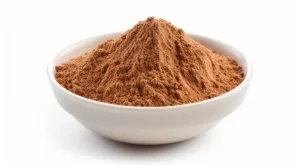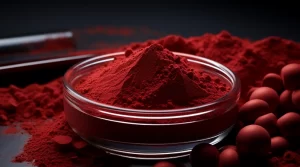The effects of resveratrol
Was ist Resveratrol?
Resveratrol is an antiviral substance secreted by plants. It is found in more than 300 edible plants (common ones include: grapes, blueberries, cranberries, peanuts, cocoa, etc.). It is used to fight trauma, bacteria, infections, and ultraviolet rays. Waiting for external environmental pressure, it can be said to be the patron saint of plants.
Resveratrol is a polyphenolic antioxidant that was first isolated from resveratrol in 1940 by Takaoka.
Resveratrol is generally divided into cis and trans isomers, but the trans isomer is more stable, and many effects are only seen in the trans (such as regulating inflammatory pathways and anti-proliferation), so it has become the mainstream of current health care ingredients. It is also the main research target
Most current supplements containing resveratrol are made from Polygonum cuspidatum (plant root extract)
Resveratrol is world-famous because of a French Paradox discussion in the 1990s. At that time, it was believed that the reason why French people who are addicted to high-fat foods are less likely to suffer from cardiovascular disease is because they often drink Red wine contains resveratrol. Since then, resveratrol has been continuously discovered to have potential health benefits, including anti-aging, anti-diabetes, anti-cancer, anti-dementia, etc.
What are the proven effects of Resveratrol?
Resveratrol benefits endothelial health
The vascular endothelium is composed of a single layer of endothelial cells. It forms a physical barrier between blood and tissues and regulates the exchange of molecules between blood and tissues.
In addition, endothelial cells metabolize, synthesize, and release a variety of substances, including: vasoactive substances that regulate vascular tone, blood pressure, and local blood flow, participate in coagulation, fibrinolysis, and inflammatory and immune responses, and growth factors that promote cell growth.
If the ability of endothelial cells to act as a physical barrier and the ability to metabolize, synthesize, and release these substances is disrupted, endothelial cell dysfunction will occur, thereby promoting the occurrence and progression of cardiovascular disease.
A systematic literature review and meta-analysis (including 17 randomized controlled clinical trials) pointed out that resveratrol significantly changes the degree of blood flow-mediated dilation and intercellular adhesion factor 1 concentration.
However, there were no significant changes in vascular cell adhesion protein type I, fibrinogen, and plasminogen promoter inhibitor 1 (
Resveratrol supplementation may be helpful in improving vascular endothelial function, but due to the heterogeneity of the included studies, more studies are needed for further verification.
Resveratrol helps regulate blood pressure
Hypertension is a chronic disease that can lead to a variety of health problems, such as cardiovascular disease, myocardial infarction, stroke, retinopathy, and kidney failure.
It is estimated that about 1 billion people worldwide have hypertension, and by 2025, this number will reach 1.56 billion.
Although pharmacotherapy and lifestyle changes, particularly dietary management and exercise, are considered common strategies in this condition, compliance with these approaches is often low.
A systematic literature review and meta-analysis (including 17 randomized controlled clinical trials with a total of 681 participants) pointed out that the antihypertensive effect of resveratrol on systolic blood pressure, mean arterial pressure and pulse pressure is beneficial, but not effective. Significantly, whereas no relevant effect was observed on diastolic blood pressure.
In addition, subgroup analysis showed that the relevant blood pressure improvement effect was most significant in subjects with a daily dose of ≥300 mg or patients with diabetes.
Resveratrol may be helpful in regulating blood pressure, especially at high doses (≥300 mg/day) and in patients with diabetes, but due to the heterogeneity of the included studies, more studies are needed for further verification.
Resveratrol benefits memory and cognitive performance
Age-related cognitive decline, characterized by functional decline in mental processes such as attention regulation, memory capacity, and processing speed, can pose a significant burden to individuals as it is associated with reduced functional independence and quality of life.
The number of people over the age of 60 is expected to double by 2050. Although aging is an inevitable part of aging, the rate of degeneration varies widely between individuals, caused by modifiable lifestyle factors such as exercise. , body mass index and dietary patterns.
A systematic literature review and meta-analysis (including 4 randomized controlled trials with a total of 226 participants) reported that resveratrol supplementation had no significant effect on memory and cognitive abilities (as assessed by auditory verbal learning tests, including learning ability, delayed recall, memory, and recognition).
So far, there is limited evidence that resveratrol supplementation does not significantly help memory and cognitive abilities. More large-scale trials with precise design are still needed for further verification.
Resveratrol benefits bone health
Osteoporosis is a bone disease characterized by reduced bone mass and microstructural changes, leading to bone fragility and increased risk of fractures.The prevalence of osteoporosis increases steadily as we age, causing an estimated 1.5 million fractures in the United States each year
According to the World Health Organization (WHO), osteoporosis is defined as a bone mineral density of the hip or spine that is at least 1% greater than the average peak bone mass in young healthy adults, as measured by dual-energy x-ray absorptiometry (DXA). 2.5 standard deviations lower.
A systematic literature review and meta-analysis (including 6 randomized controlled trials with a total of 264 participants) pointed out that compared with placebo treatment, resveratrol supplementation can significantly improve serum alkaline phosphatase and bone alkaline phosphate. enzyme values, but there was no significant improvement in serum calcium, osteocalcin, C-terminal telopeptide of type I collagen and N-terminal procollagen type I chain.
The underlying mechanism may be related to the promotion of osteoblast formation and differentiation by resveratrol, mediated by osteoblast-derived BAP, and antagonism of osteoclasts.
Resveratrol may have a positive effect on improving bone health, but due to the small sample size and heterogeneity among studies, more research is needed to confirm it.
Resveratrol benefits cardiovascular health
Cardiovascular disease is the leading cause of death from non-communicable diseases and is closely linked to lifestyle factors such as physical inactivity, smoking and unhealthy eating habits, and its prevalence has increased dramatically around the world
A heart-wrenching statistic is that in the United States, someone dies from cardiovascular disease every 39 seconds, killing more people than cancer, so having appropriate strategies to manage cardiovascular health and its associated diseases is critical for any healthcare system. necessary.
A meta-analysis (including 21 randomized controlled trials with a total of 681 overweight or obese participants) found that resveratrol supplementation significantly reduced total cholesterol, systolic blood pressure, and fasting plasma glucose.
In addition, subgroup analysis showed that the related effects on reducing total cholesterol, systolic blood pressure, diastolic blood pressure, glucose and insulin were most significant among subjects who consumed higher doses of resveratrol (daily dose ≥300 mg).
For overweight or obese people, resveratrol supplementation may have positive benefits for cardiovascular health, but more research is needed to confirm its clinical benefit.
Resveratrol improves hyperlipidemia
Hyperlipidemia can be roughly divided into elevated cholesterol, elevated triglycerides, or both. It is one of the components of metabolic syndrome and is closely related to obesity, type 2 diabetes, hypertension, coronary heart disease, and stroke.
The cause of hyperlipidemia may be genetic, environmental, or both.
In general, genetic syndromes are characterized by very high cholesterol levels (>300 mg/dL) and triglyceride levels (>500 mg/dL), cutaneous xanthomas, family history, or resistance to maximum therapeutic doses of lipid-lowering drugs. The agent lacks the expected response.
A systematic literature review and meta-analysis (including 21 randomized controlled trials with 949 adults) pointed out that the use of resveratrol failed to significantly improve blood lipid-related values (such as total cholesterol, high low-density lipoprotein cholesterol and triglycerides).
So far, oral resveratrol has no significant effect on improving hyperlipidemia.
Resveratrol helps with weight loss
According to multiple epidemiological studies, obesity has been identified as a major causative factor for many diseases, such as: cancer (breast cancer, endometrial cancer, ovarian cancer, colon cancer, esophageal cancer, kidney cancer, pancreatic cancer, prostate cancer) cancer), type 2 diabetes, hypertension, stroke, coronary heart disease, congestive heart failure, asthma, chronic back pain, osteoarthritis, pulmonary embolism, gallbladder disease
Therefore, losing weight is not only to pursue a perfect body, but also to be healthier
A systematic literature review and meta-analysis (including 28 randomized controlled trials with a total of 1,514 participants) found that oral resveratrol (median dose: 300 mg, median duration 12 weeks) may help Lower body mass index and waist circumference, but no significant improvement in body fat.
In addition, subgroup analysis further found that the related effects on reducing body weight and body mass index were particularly significant in subjects with daily doses <500 mg, long-term intervention (≥3 months), and obese patients.
Oral resveratrol may have a positive effect on weight loss, but more randomized controlled trials are needed to further verify it.
Resveratrol regulates blood sugar and benefits diabetics
Type 2 diabetes is a common multifactorial genetic syndrome that is determined by several different genetic and environmental factors. The disease currently affects 150 million people worldwide, and incidence rates are increasing rapidly due to secondary factors such as obesity, high blood pressure and a sedentary lifestyle.
If one parent has type 2 diabetes, the risk of the offspring developing type 2 diabetes is 35%; if both parents have type 2 diabetes, the risk increases to 70%
A systematic literature review and meta-analysis (including 9 randomized controlled trials with a total of 283 participants) pointed out that resveratrol supplementation can improve fasting blood glucose (-0.29 mmol/l), insulin resistance index and insulin resistance in patients with diabetes. level (-0.64 U/mL).
In addition, subgroup analysis showed that resveratrol at a daily dose greater than 100 mg had the most significant effect on reducing fasting blood glucose.
The mechanism behind it may be related to the activation of “histone deacetylase SIRT1” and “adenylate-activated protein kinase” by resveratrol.
For type 2 diabetes, the use of resveratrol may have a positive effect on blood sugar control, but due to limited sample size and possible bias, more large-scale randomized controlled trials are still needed for further confirmation.
Resveratrol improves non-alcoholic fatty liver disease
Non-alcoholic fatty liver disease is a series of diseases caused by excessive accumulation of fat (more than 5% of the liver weight) (excluding alcohol consumption, viral infection or other special causes), including non-alcoholic steatohepatitis, liver fibrosis and portal hypertension. hardening
It is estimated that about one-third of the total population in the Western world and Asia currently suffers from this disease. Possible symptoms include right upper quadrant pain, fatigue, hepatosplenomegaly, etc. Although changing lifestyle, limiting calorie intake, and losing weight are beneficial to the disease. There is positive help in the situation, but it is often difficult for most people to achieve it.
Resveratrol is considered a savior in the fight against fatty liver disease because it is anti-inflammatory, antioxidant and mimics the effects of calorie restriction.
A systematic literature review and meta-analysis (including 4 clinical trials with 158 participants) pointed out that resveratrol did not have any positive effects on liver fibrosis and fatty liver-related disease parameters (such as AST, ALT), that is, The evidence is still insufficient.
So far, the use of resveratrol has not been found to be beneficial for non-alcoholic fatty liver disease.
Resveratrol fights cancer
Cancer remains one of the top ten causes of death in most countries, with 1.6 million new cases diagnosed in the United States every year, and the incidence rate increases with age.
Radiation and chemotherapy are the most common cancer treatment options, but the resistance of cancer cells to anti-cancer drugs often results in unsatisfactory treatment results.
A literature review pointed out that based on the available in vitro and in vivo studies, it was found that resveratrol can promote apoptosis, anti-proliferation and anti-inflammation on cancer cells, and can be used as a sensitizer for anti-cancer drugs to enhance anti-cancer effects. Cancer treatment effectiveness.
Although resveratrol has shown good anti-cancer effects in numerous in vitro and in vivo animal experiments, there is still a lack of large-scale human trials, so its dosage, effectiveness and safety have yet to be confirmed.
Resveratrol benefits age-related macular degeneration
Choroidal neovascularization is the most complex complication of macular degeneration (wet disease). These new abnormal blood vessels often lead to macular edema, retinal pigment epithelial cell degeneration and even retinal detachment. If not treated in time, the most severe cases can cause blindness.
The vascular endothelial growth factor VEGF inhibitor is currently the main therapy used to treat wet macular degeneration, which can slow down abnormal angiogenesis and vision degradation.
A preliminary study found that resveratrol can inhibit the vascular endothelial growth factor VEGF, achieving the effect of slowing down choroidal neovascularization (triggered by the inflammatory hormone TGF-β or tissue hypoxia), and may improve the disease process of macular degeneration. .
In addition, other small studies have found that resveratrol (1 hour after taking) helps increase choroidal thickness (increased blood flow, which can slow the risk of macular degeneration) (compared to placebo).
As of now, no studies have directly confirmed the relationship between resveratrol and age-related macular degeneration, so further confirmation is needed
Resveratrol extends animal lifespan
So far, the scientific community believes that the most effective way to extend human life is through calorie restriction, which is to limit daily caloric intake by 20% to 40% under balanced nutrition.
In many studies, restricting caloric intake in various species has also been shown to significantly extend lifespan (up to 60%). Although long-term studies in humans have not yet been released, the preliminary evidence is certain and the results should be similar.
A six-month human study found that following a calorie-restricted diet reduced a variety of lifespan-related values, including insulin levels, body temperature, and DNA damage, and helped reduce the incidence of metabolic syndrome, cardiovascular disease, and cancer. Rate.
Resveratrol has been found in some studies to have disease-fighting and life-extending effects similar to those of calorie restriction.
Therefore, in a controlled animal study, it was found that (both groups were fed high-calorie food), experimental mice that ingested resveratrol could significantly increase their survival rate and reduce mortality by 31% (in addition to increasing insulin sensitivity and lowering blood sugar). , improve mitochondrial production capacity, improve mobility, etc.)
The life-extending effect of resveratrol in humans has yet to be determined, so it remains to be confirmed by more large-scale and accurately designed studies in the future.
Resveratrol Benefits Ulcerative Colitis
Ulcerative colon is a type of inflammatory bowel disease. The main clinical symptoms include bloody diarrhea, abdominal cramps and other symptoms. It is a chronic inflammation caused by immune dysfunction (the intestinal mucosa is the main affected part), and patients There is also a higher incidence of bowel cancer
It is currently believed that oxidative stress and free radicals play an important role in the cause and exacerbation of diseases, and resveratrol has become the target of many studies because of its excellent reactive oxygen scavenging ability.
A double-blind controlled study found that taking resveratrol (500 mg daily) not only helps reduce the concentration of malondialdehyde (MDA, a product of organisms attacked by free radicals, the higher it indicates greater oxidative stress), but also It can increase the body’s total antioxidant capacity and superoxide dismutase concentration.
In addition, disease activity and quality of life were significantly improved in the resveratrol-treated group (compared to the placebo control group).
() ()


